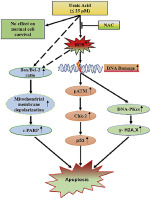当前位置:
X-MOL 学术
›
Chem. Biol. Interact.
›
论文详情
Our official English website, www.x-mol.net, welcomes your
feedback! (Note: you will need to create a separate account there.)
Usnic acid induces apoptosis in human gastric cancer cells through ROS generation and DNA damage and causes up-regulation of DNA-PKcs and γ-H2A.X phosphorylation.
Chemico-Biological Interactions ( IF 4.7 ) Pub Date : 2019-11-09 , DOI: 10.1016/j.cbi.2019.108898 Kunal Kumar 1 , Jai P N Mishra 1 , Rana P Singh 2
Chemico-Biological Interactions ( IF 4.7 ) Pub Date : 2019-11-09 , DOI: 10.1016/j.cbi.2019.108898 Kunal Kumar 1 , Jai P N Mishra 1 , Rana P Singh 2
Affiliation

|
Usnic acid, a dibenzofuran derivative found in many lichen species, is reported to have anticancer activity against human gastric cancer. We investigated the molecular alterations associated with anticancer effects of usnic acid against human gastric adenocarcinoma AGS and gastric carcinoma SNU-1 cells. Usnic acid (10-25 μM) treatment to these cells caused a significant increase in mitochondrial membrane depolarization and apoptotic cells. Apoptosis induction was accompanied by an increase in the ratio of Bax:Bcl-2 expression and cleaved-PARP. Usnic acid increased the comet tail length and tail DNA in alkaline comet assay indicating DNA double-strand breaks which was also evidenced by an increase in γH2A.X (Ser139) phosphorylation. The expression of DNA damage response proteins including DNA-PKcs, pATM (Ser1981), Chk-2 and p53 were increased. Further, N-acetyl cysteine, a known reactive oxygen species (ROS) scavenger, reversed the effects of usnic acid on expression of DNA damage response proteins and γH2A.X (Ser139) phosphorylation. This reversal was also observed in comet assay in a time and dose-dependent manner suggesting that usnic acid-induced DNA damage was caused by ROS. In addition, the non-toxic concentrations (1-10 μM) of usnic acid inhibited colony forming potential of AGS cells indicating its anti-proliferation activity. More importantly, the concentration of usnic acid that caused significant death in gastric cancer cells, did not show any considerable toxicity to normal human embryonic kidney HEK293 cells, human keratinocyte HaCaT cells and mouse primary gastric cells. Collectively, these results for the first time demonstrated the selective apoptotic effect of usnic acid (10-25 μM) through ROS generation and DNA damage on human gastric cancer cells accompanied with upregulation of γH2A.X (Ser139) phosphorylation, DNA-PKcs and p53.
中文翻译:

松萝酸通过ROS的产生和DNA损伤诱导人胃癌细胞凋亡,并引起DNA-PKcs和γ-H2A.X磷酸化的上调。
松萝酸是在许多地衣物种中发现的一种二苯并呋喃衍生物,据报道对人胃癌具有抗癌活性。我们研究了与松萝酸对人胃腺癌AGS和胃癌SNU-1细胞的抗癌作用相关的分子变化。对这些细胞的松萝酸(10-25μM)处理导致线粒体膜去极化和凋亡细胞的显着增加。凋亡诱导伴随着Bax:Bcl-2表达和PARP裂解比例的增加。在碱性彗星试验中,松萝酸增加了彗星尾巴的长度和尾巴DNA,表明DNA双链断裂,这也可以通过γH2A.X(Ser139)磷酸化的增加来证明。DNA损伤反应蛋白包括DNA-PKcs,pATM(Ser1981),Chk-2和p53的表达增加。此外,已知的活性氧(ROS)清除剂N-乙酰基半胱氨酸逆转了松萝酸对DNA损伤反应蛋白表达和γH2A.X(Ser139)磷酸化的影响。在彗星试验中也以时间和剂量依赖性的方式观察到这种逆转,表明松萝酸诱导的DNA损伤是由ROS引起的。此外,松萝酸的无毒浓度(1-10μM)抑制了AGS细胞集落形成的潜力,表明其具有抗增殖活性。更重要的是,在胃癌细胞中引起大量死亡的松萝酸浓度对正常人胚胎肾HEK293细胞,人角质形成细胞HaCaT细胞和小鼠原代胃细胞没有明显的毒性。总的来说,
更新日期:2019-11-09
中文翻译:

松萝酸通过ROS的产生和DNA损伤诱导人胃癌细胞凋亡,并引起DNA-PKcs和γ-H2A.X磷酸化的上调。
松萝酸是在许多地衣物种中发现的一种二苯并呋喃衍生物,据报道对人胃癌具有抗癌活性。我们研究了与松萝酸对人胃腺癌AGS和胃癌SNU-1细胞的抗癌作用相关的分子变化。对这些细胞的松萝酸(10-25μM)处理导致线粒体膜去极化和凋亡细胞的显着增加。凋亡诱导伴随着Bax:Bcl-2表达和PARP裂解比例的增加。在碱性彗星试验中,松萝酸增加了彗星尾巴的长度和尾巴DNA,表明DNA双链断裂,这也可以通过γH2A.X(Ser139)磷酸化的增加来证明。DNA损伤反应蛋白包括DNA-PKcs,pATM(Ser1981),Chk-2和p53的表达增加。此外,已知的活性氧(ROS)清除剂N-乙酰基半胱氨酸逆转了松萝酸对DNA损伤反应蛋白表达和γH2A.X(Ser139)磷酸化的影响。在彗星试验中也以时间和剂量依赖性的方式观察到这种逆转,表明松萝酸诱导的DNA损伤是由ROS引起的。此外,松萝酸的无毒浓度(1-10μM)抑制了AGS细胞集落形成的潜力,表明其具有抗增殖活性。更重要的是,在胃癌细胞中引起大量死亡的松萝酸浓度对正常人胚胎肾HEK293细胞,人角质形成细胞HaCaT细胞和小鼠原代胃细胞没有明显的毒性。总的来说,











































 京公网安备 11010802027423号
京公网安备 11010802027423号